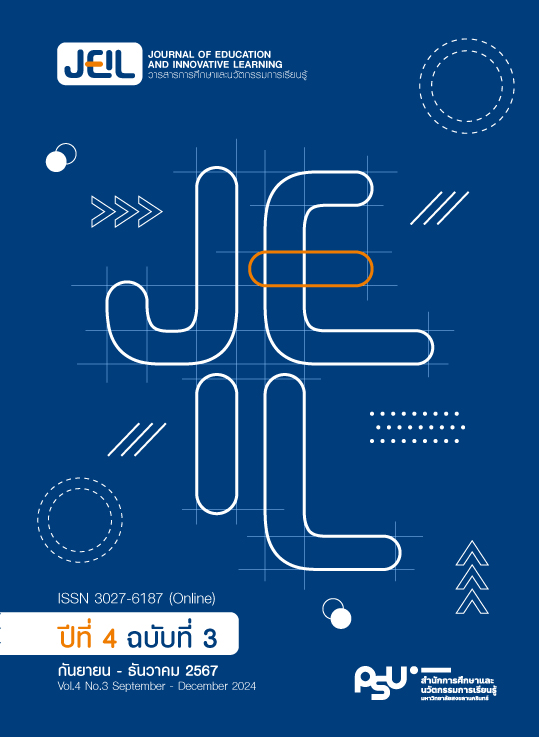การพัฒนาองค์ประกอบ ตัวชี้วัด และเกณฑ์การประกันคุณภาพการศึกษาภายในสถานศึกษา ระดับการศึกษาขั้นพื้นฐาน ในสังคมพหุวัฒนธรรมจังหวัดชายแดนภาคใต้
Main Article Content
บทคัดย่อ
การวิจัยครั้งนี้มีจุดมุ่งหมาย 1) เพื่อพัฒนาองค์ประกอบ ตัวชี้วัด การประกันคุณภาพการศึกษาภายในสถานศึกษา ระดับการศึกษาขั้นพื้นฐานในสังคมพหุวัฒนธรรมจังหวัดชายแดนภาคใต้ 2) เพื่อตรวจความตรงเชิงโครงสร้างขององค์ประกอบ ตัวชี้วัด การประกันคุณภาพการศึกษาภายในสถานศึกษา 3) เพื่อสร้างและหาคุณภาพเกณฑ์การประเมินการประกันคุณภาพการศึกษาภายในสถานศึกษา โดยอาศัยทฤษฎีฉันทามติทางวัฒนธรรม และ 4) เพื่อสร้างและหาคุณภาพคู่มือการประเมินคุณภาพการศึกษาภายในสถานศึกษา ผลการวิจัยพบว่า 1) ผลการศึกษาองค์ประกอบ ตัวชี้วัด การประกันคุณภาพการศึกษาภายในสถานศึกษา ประกอบด้วย 3 องค์ประกอบ 11 ตัวชี้วัด ได้แก่ องค์ประกอบที่ 1 การจัดการเรียนรู้ในสังคมพหุวัฒนธรรม มี 4 ตัวชี้วัด องค์ประกอบที่ 2 การบริหารสถานศึกษาในสังคมพหุวัฒนธรรม มี 4 ตัวชี้วัด องค์ประกอบที่ 3 การเรียนรู้ของผู้เรียนในสังคมพหุวัฒนธรรม มี 3 ตัวชี้วัด 2) โมเดลมีความสอดคล้องกับข้อมูลเชิงประจักษ์ มีค่าเป็นบวกระหว่าง 0.94-0.97 และมีนัยสำคัญทางสถิติระดับ .01 ทุกองค์ประกอบ 3) ผลการหาคุณภาพด้านความเหมาะสมของเกณฑ์การประเมินการประกันคุณภาพการศึกษาภายในสถานศึกษาโดยอาศัยทฤษฎีฉันทามติทางวัฒนธรรมมีความเหมาะสมทุกข้อ มีค่าภาพรวมเฉลี่ย 0.69 คือ เหมาะสมมาก และ 4) ผลการหาคุณภาพคู่มือการประเมินคุณภาพการศึกษาภายในสถานศึกษา ด้านความเหมาะสม ด้านความถูกต้อง ด้านความเป็นประโยชน์ และความเป็นไปได้ ทุกด้านอยู่ในระดับมากที่สุด
Article Details

อนุญาตภายใต้เงื่อนไข Creative Commons Attribution-NonCommercial-NoDerivatives 4.0 International License.
เนื้อหาและข้อมูลในบทความที่ตีพิมพ์ในวารสารการศึกษาและนวัตกรรมการเรียนรู้ ถือเป็นข้อคิดเห็นและความรับผิดชอบของผู้เขียน ซึ่งกองบรรณาธิการวารสาร ไม่จำเป็นต้องเห็นด้วยหรือร่วมรับผิดชอบใด ๆ และไม่สงวนสิทธิ์การคัดลอกบทความเพื่อใช้ประโยชน์ทางวิชาการ แต่ให้อ้างอิงข้อมูลแสดงที่มาของบทความทุกครั้งที่นำไปใช้ประโยชน์
เอกสารอ้างอิง
Arphattananon, T. (2020). Multicultural schools in the making: cultivating multicultural competence through education for teachers and students. Bangkok, Thailand: Research Support Office and Mahidol University. [in Thai]
Bank, A. J., & Bank, C. A. (1998). Multicultural education: Issues and perspectives (3rd ed.). Needham Heights, MA: Allyn & Bacon.
Bank, J. A. (2007). An introduction to multicultural education (2nd ed.). Boston: University of Washington, Seattle.
Borgatti, S. P., & Halgin, D. S. (2011). 10 Consensus analysis. A Companion to Cognitive Anthropology, 171.
Buason, R. (2019). Research and development of educational innovations. Bangkok, Thailand: Chulalongkorn University Press. [in Thai]
Choosuwan, R. (2010). Development of the educational administration model of basic educational institutions in the special development zone of the southern border provinces. Bangkok, Thailand: Educational Development Office, Special Development Zone, Southern Border Provinces. [in Thai]
Gorski, P. (2016). Making better multicultural and social justice teacher educators: A qualitative analysis of the professional learning and support needs of multicultural teacher education faculty. Multicultural Education Review, 8(3), 139-159.
Hox, J. J. (2017). Multilevel Analysis: Techniques and Applications (3rd ed.). Routledge.
Kanchanawasi, S. (2019). Evaluation theory (9th ed.). Bangkok, Thailand: Chulalongkorn University Press. [in Thai]
Kantiwong, A., & Pasiphol, S. (2019). A decision making of test parallelism on rational drug use by using formal cultural consensus theory. Royal Thai Army Medical Journal, 72(3), 155.
Karuna, P. (2018). Multicultural education administration with two religions in the school. In Graduate School Conference 2018, 352-361. Bangkok, Thailand: Suan Sunandha Rajabhat University. [in Thai]
Kelloway, E. K. (2015). Using Mplus for structural equation modeling: A Researcher's Guide (2nd ed.). SAGA.
Ladson-Billings, G. (1994). The dream-keepers: Successful teachers of African American children. Needham Heights, MA: Allyn & Bacon.
Ministry of Education. (1999). National Education Act 1999. Bangkok: Ministry of Education.
Nieto, S. (2004). Affirming diversity: The sociopolitical context of multicultural education (4th ed.). New York: Allyn & Bacon.
Nieto, S. (2007). Multicultural education: Issues and perspectives (6th ed.). USA: John Wiley and Sons.
Office of the Secretariat of the Education Council. (2021). Guidelines for developing an internal quality assurance system in schools. Bangkok, Thailand: Office of Educational Policy and Planning. [in Thai]
Prachanban, P. (2018). Techniques for analyzing and applying structural equation models for research and evaluation. Phitsanulok, Thailand: AT Graphic Center. [in Thai]
Ritcharoon, P. (2014). Project evaluation techniques. Bangkok, Thailand: House of Kermist. [in Thai]
Singhadechasit, S. (2017). Development of professional teacher indicators. An Online Journal of Education, 2(4), 695-707. Retrieved from https://so01.tci-thaijo.org/index.php/OJED/article/view/161788 [in Thai]
Sleeter, C. E., & Grant, C. A. (2003). Making choices for multicultural education: Five approaches to race, class and gender (4th ed.). New York: John Wiley & Sons.
Thongmark, S., Neimted, W., Choosuwan, R., & Sittichai, R. (2018). Looking backwards and forwards of educational quality in three southern border provinces of Thailand. Princess of Naradhiwas University Journal of Humanities and Social Sciences, 5(Special 3), 186-198. Retrieved from https://so05.tci-thaijo.org/index.php/pnuhuso/article/view/117021 [in Thai]
Wanichsan, D. (2012). A majority density approach with the cooperation of multiple experts for developing testing and diagnostic learning systems based on a concept-effect relationship model (Doctoral dissertation). Mahidol University, Nakhon Pathom, Thailand. [in Thai]
Wichayanuwat, A. (2014). The development of internal quality assurance system on the basic educational school of 3 provinces in southern border, Thailand. Journal of Educational Research Faculty of Education, Srinakharinwirot University, 8(2), 263-274. Retrieved from https://ejournals.swu.ac.th/index.php/jre/article/view/6818 [in Thai]
Wisalaporn, S. (2011). Models of educational administration in the southern border provinces. Bangkok, Thailand: V.T.C. Communication. [in Thai]


